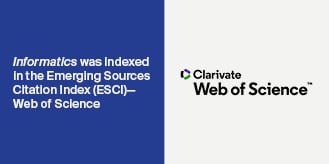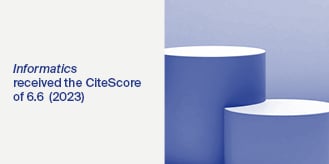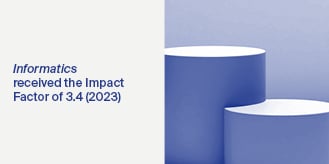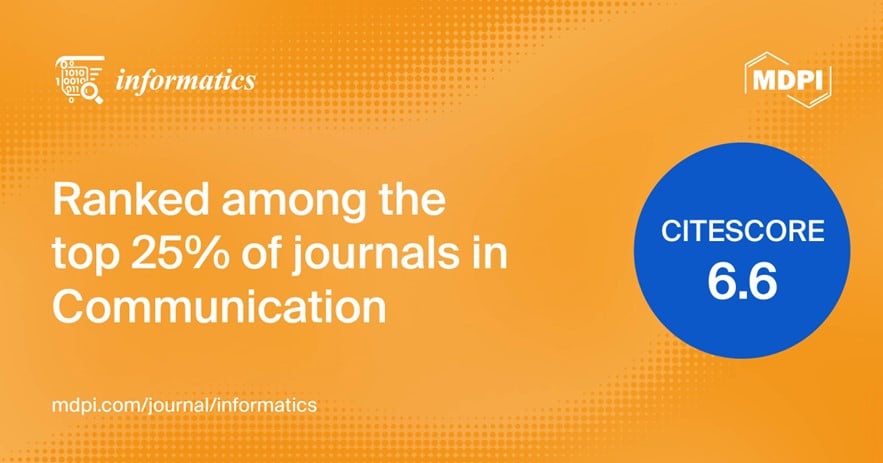10th Anniversary
The year 2024 marks the 10th anniversary of Informatics, a peer-reviewed open access journal on information and communication technologies, human–computer interaction, and social informatics. With an Impact Factor of 3.4 and a CiteScore of 6.6, the journal is covered in ESCI, Scopus and other databases. The journal has published more than 550 papers from more than 1900 authors. More than 1000 reviewers have reviewed the journal at least once. We equally value the contributions made by our editors, authors, and reviewers.
In honor of the journal’s 10th anniversary, we are reflecting on our past accomplishments and embarking on an exciting new chapter. We invite you to join us in celebrating this milestone for our journal and to explore the content we have prepared for you below.
10th Anniversary
Journal History

Prof. Dr. Antony Bryant was appointed as the Editor-in-Chief of the Informatics.
Informatics was indexed in the Emerging Sources Citation Index (ESCI)—Web of Science.

Informatics was indexed in Scopus—Elsevier.
Informatics received its Citescore (2021) of 4.8.
Informatics’s Impact Factor was released in June 2023 (3.1).
Informatics received a CiteScore of 6.6 (2023) from Scopus.

2024 Informatics received an Impact Factor of 3.4 (2023), ranks in Q2 in the "Computer Science, Interdisciplinary Applications" category.

Key Figures
Testimonials
 Prof. Dr. Remo Pareschi
Prof. Dr. Remo PareschiUniversity of Molise, Italy
I have been an editor of Informatics since 2021 and witnessed the journal's remarkable growth and development in the past few years. Informatics has become a leading platform for disseminating
[...] Read more. Prof. Dr. Zhiwen Yu
Prof. Dr. Zhiwen YuSouth China University of Technology, China
Being a part of the Informatics journal as an Editorial Board Member has been an incredibly rewarding experience. Over the years, I have had the privilege of working alongside esteemed
[...] Read more. Prof. Dr. Valentina Dagiene
Prof. Dr. Valentina DagieneVilnius University, Lithuania
As an Editorial Board Member for Informatics, I have been actively involved in a decade of ground-breaking research and debate in informatics. The journal's passionate commitment to open access has
[...] Read more.View All...
Top 10 Cited Papers
News
The CiteScore for Informatics has increased to 6.6!

We are pleased to announce that the 2023 CiteScore has been released. Based on the citation activity in Scopus, the CiteScore for Informatics has increased to 6.6 (increased by 37% compared with 2022, Q1 in the sub-subject area of “Communication”, Q2 in the sub-subject area of “Computer Networks and Communications”). The journal’s performance is inseparable from the support and dedication of all journal editors, reviewers, authors, and readers. We would like to take this opportunity to thank all of you who have contributed to the journal.
Highlights of Editor's Choice Articles
Paper 1: Human-Computer Interaction in Digital Mental Health
https://www.mdpi.com/2227-9709/9/1/14
- Digital mental health tools can help resolve systemic mental health care issues and serve as an adjunct to mental health care.
- Future research may benefit from integrating a predictive model with a human-centered design (HCD).
- Future research should prioritize the integration of predictive models with HCD for enhanced quality, safety and usability.
Paper 2: Visual Analytics for Predicting Disease Outcomes Using Laboratory Test Results
https://www.mdpi.com/2227-9709/9/1/17
- Combines Eclat & XGBoost.
- Aids disease prediction.
- Enhances interpretability & user trust.
Paper 3: Evaluating and Revising the Digital Citizenship Scale
https://www.mdpi.com/2227-9709/9/3/61
- Investigated the psychometric properties of the Digital Citizenship Scale (DCS).
- The 26-item five-factor DCS tool should be refined into an 19-item four-factor instrument.
- The largest predictor of online political engagement was critical perspective.
- The other predictor is a willingness to use the internet in active ways beyond consuming content.
Paper 4: A Visual Data Storytelling Framework
https://www.mdpi.com/2227-9709/9/4/73
- A modular approach to customising messages for visual data content.
- Bridge theories and methods from data visualisation, communication and storytelling.
- Illustrate ontological elements, design spaces and information processing procedures.
- Enable great flexibility for information planning and content evaluation.
Paper 5: The Influence of Light and Color in Digital Paintings of Environmental Issues on Emotions and Cognitions
https://www.mdpi.com/2227-9709/10/1/26
- The most emotionally expressive is monochromatic images.
- The composition is important to convey utopia and dystopia.
- The surrounding atmosphere induces despair, while life-inspired objects evoke hope.
Paper 6: Affective Design Analysis of Explainable Artificial Intelligence (XAI): A User-Centric Perspective
https://www.mdpi.com/2227-9709/10/1/32
- Affective trust calibration for XAI is confirmed, with emotions like interest, trust, and fear influencing trust and reliance.
- Users categorized into emotion or information valuers, impacting trust calibration routes based on motivation and ability.
- XAI design elements such as explanation form and communication style significantly affect both affective and cognitive trust calibration routes.
- External factors play a crucial role in XAI effectiveness, necessitating contextualized design.
- User experiences with AI types moderate XAI effects, highlighting the need for tailored approaches across different AI use cases.
Paper 7: Genealogical Data Mining from Historical Archives: The Case of the Jewish Community in Pisa
https://www.mdpi.com/2227-9709/10/2/42
- Creation of an Interactive Map for smart navigation of the Jewish Cemetery in Pisa.
- Usage of LLMs to extract data from documents of the Jewish Historical Archives.
- Construction of Genealogical trees from the extracted data.
- Integration of Genealogical trees with the Interactive Map of the Jewish Cemetery in Pisa.
Paper 8: A Machine-Learning-Based Motor and Cognitive Assessment Tool Using In-Game Data from the GAME2AWE Platform
https://www.mdpi.com/2227-9709/10/3/59
- GAME2AWE uses exergames for elderly's cognitive & motor skill improvement.
- GAME2AWE's data helps assess seniors' motor & cognitive conditions.
- Machine learning models accurately predict elderly's motor & cognitive states.
- Study pioneers in assessing elderly's states with exergame data & machine learning.
Paper 9: Exploring How Healthcare Organizations Use Twitter: A Discourse Analysis
https://www.mdpi.com/2227-9709/10/3/65
- The findings revealed that building a reputation on Twitter goes beyond just evaluating the popularity of a tweet in the online sphere. Topic modeling, when applied synchronously with hashtag and tagging analysis can provide an increase in tweet popularity.
- Additionally, the study showed differences in language use and style across the Twitter accounts’ categories and discussed how the impact of popular association rules could translate to significantly more user engagement.
- Overall, the results of this study provide insights into natural language processing for health literacy and present a way for organizations to structure their future content to ensure maximum public engagement.
Paper 10: A Machine Learning-Based Multiple Imputation Method for the Health and Aging Brain Study–Health Disparities
https://www.mdpi.com/2227-9709/10/4/77
3-Step workflow: (1) missingness eval; (2) ML-based imputation; and (3) imputation eval.










